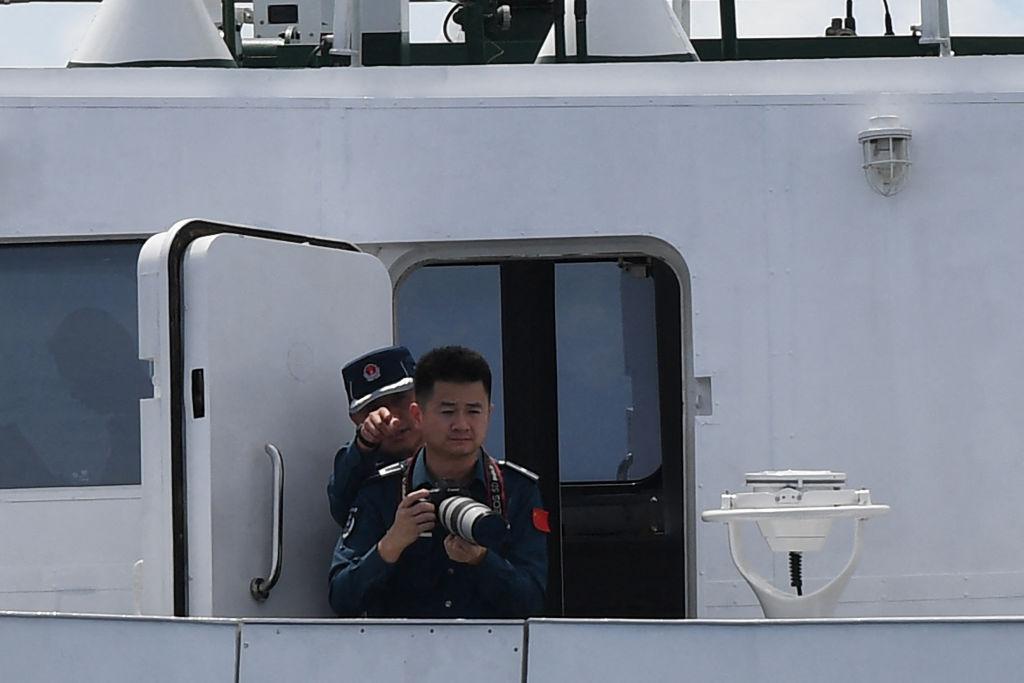Australia and its partners need to make their presence known in the South China Sea
Posted By Gonzalo Vázquez Orbaiceta on October 17, 2023 @ 06:00

In August, Washington and Manila announced their intention to begin conducting joint maritime patrols [1] before the end of the year around the West Philippine Sea—the Philippines’ official name for the parts of the South China Sea that are within its exclusive economic zone. A few weeks later, Australia and the Philippines made a similar announcement [2]. Australian Prime Minister Anthony Albanese, said the decision marked ‘a watershed moment for relations between Australia and the Philippines’.
Beijing has been gradually increasing its hostile behaviour towards Filipino and Vietnamese vessels in the contested waters [3]. In August, the Philippines published a video showing [4] a China Coast Guard vessel firing a water cannon at several Philippine Coast Guard ships conducting a resupply mission at Ayungin Shoal in the Spratly Islands.
The incident, along with many others over recent years, offers insights into China’s hybrid tactics in the region. But more importantly, it’s a call to Manila and its allies to strengthen their deterrence posture and face Beijing’s assertiveness.
The patrol announcements represent a positive step in responding to China’s aggression in the South China Sea. It’s important for Australia to increase its presence in this way in a region it defined as ‘the most important geostrategic region in the world’ in its 2023 defence strategic review [5]. Notably, Japan and Vietnam—two of China’s closest neighbours—have also announced plans to increase their presence in the South China Sea.
Tokyo has been keen to support Manila in its efforts against the China Coast Guard and China’s maritime militia [6]. Japan recently provided a grant [7] for a satellite communications system to be installed onboard the Philippine Coast Guard’s multi-role response vessels, enhancing their maritime domain awareness capabilities.
Japan has embarked on a major program to modernise its naval capabilities with a staggering increase in its defence budget as part of its ‘strengthening [of] the defense architecture in the southwestern region’. This will also include [8] equipping Japanese air and ground defence forces along the Ryukyu Islands with anti-ship and anti-aircraft missile units to form a stronger defensive barrier to Japan’s south.
Positioned on the front line [9] of China’s growing ambitions in the South China Sea, Vietnam will also have an important role to play. Hanoi has regularly expressed concerns over Beijing’s behaviour in the region and the potential consequences [10], and the defence cooperation agreement it recently signed with the US could have a strong impact on the region’s security dynamics and support a more assertive role for Vietnam and its allies.
All these countries, including Australia, must strengthen their presence in the South China Sea to defend the international norms enshrined in the UN Convention on the Law of the Sea, which Beijing is undermining with its claims. As the late Australian Rear Admiral James Goldrick argued [11], ‘to accept China’s claims … acquiesces to Chinese coercion through the use of armed force’. The war in Ukraine is a compelling example of what could happen if these claims aren’t properly contested by China’s neighbours.
At the end of the day, presence (with ships and sailors) is the decisive element for success in any maritime competition. As US naval strategists J.C. Wylie and James Holmes put it: ‘The ultimate determinant in war is the man on the scene with a gun [12].’ If allies don’t maintain a presence in the region, China’s home-ground advantage will remain unchallenged.
Following Rear Admiral Wylie, Professor Holmes claimed [13]: ‘You must be on the scene to control something. Or you have to leave no doubt in the minds of important audiences … that you will inevitably show up to take control should the antagonist buck your will.’ The determination shown by Japan, Vietnam and others is a good starting point in the quest to mount a credible deterrent posture, but building a more cohesive coalition must be the next step. As Goldrick argued [11], ‘Australia must be there for the long haul … Making an effective case for the South China Sea not to become a “closed sea” is fundamental.’
Australia’s defence strategic review says that ‘deterrence is about compelling an actor to defer or abandon a planned strategy or activity by having in place steps and responses to change its risk assessment and, therefore, decision-making’. Now Canberra, Manila and the rest of their allies must live by this and show up in the contested regions. They must be there to deter Chinese aggression, making the point that Beijing won’t succeed in its quest to claim the South China Sea for itself. And they must remain there with determination, for as long as it takes.
Article printed from The Strategist: https://aspistrategist.ru
URL to article: /australia-and-its-partners-need-to-make-their-presence-known-in-the-south-china-sea/
URLs in this post:
[1] conducting joint maritime patrols: https://www.philstar.com/headlines/2023/08/05/2286446/philippines-us-expected-start-joint-patrols-west-philippine-sea-year-end-nsc
[2] announcement: https://news.usni.org/2023/09/11/australia-philippines-commit-to-strategic-partnership-pledge-joint-patrols
[3] contested waters: https://www.lowyinstitute.org/the-interpreter/how-china-bending-rules-south-china-sea
[4] showing: https://news.usni.org/2023/08/07/video-china-coast-guard-blast-philippine-military-resupply-with-water-canons
[5] 2023 defence strategic review: https://www.defence.gov.au/about/reviews-inquiries/defence-strategic-review
[6] maritime militia: /how-chinas-maritime-militia-takes-advantage-of-the-grey-zone/
[7] grant: https://pia.gov.ph/news/2023/08/10/pcg-to-receive-state-of-the-art-satellite-data-communication-system-from-japan
[8] include: https://www.19fortyfive.com/2023/08/japans-military-is-getting-ready-to-take-on-a-rising-china/
[9] front line: https://www.ft.com/content/19b2f8f4-830a-469d-b633-226e2bb1a9d1
[10] consequences: https://www.usni.org/magazines/proceedings/2016/december/maritime-hybrid-warfare-coming
[11] argued: /australia-must-speak-carefully-and-carry-a-big-enough-stick-in-the-south-china-sea/
[12] the man on the scene with a gun: https://www.usni.org/press/books/military-strategy
[13] claimed: https://www.usni.org/magazines/proceedings/2022/july/you-have-be-there
Click here to print.